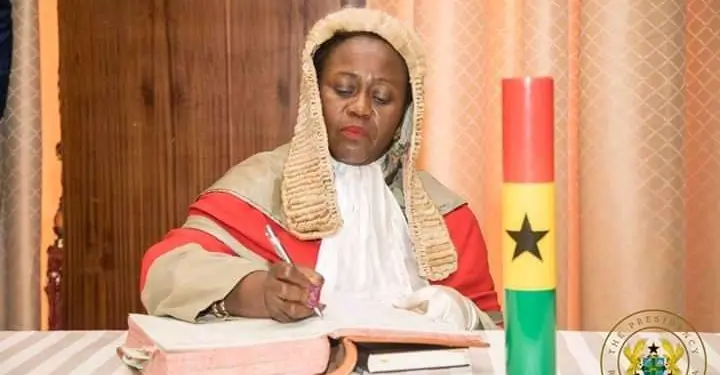Ghana stands at a constitutional crossroads. On September 1, 2025, President John Dramani Mahama officially removed Chief Justice Gertrude Araba Esaaba Sackey Torkornoo, citing findings of “misbehaviour” by a committee of inquiry — an unprecedented action under our 1992 Constitution.
This decision is more than a legal anomaly it is an affront to the principles of justice, the rule of law, and the moral fabric of our democracy. It is especially pernicious when compared to the findings of the ECOWAS Community Court of Justice, which, in her suit, effectively deemed the removal process prejudicial and a violation of her constitutional rights.
Who is Gertrude Torkornoo, and What Has She Given Ghana?
Justice, Gender, and Constitutional Duty: The Case for Chief Justice Gertrude Araba Esaaba Sackey Torkornoo
NPP Opinion Piece
NPP Opinion Piece
Follow
4 min read
·
8 hours ago
Listen
Share
Ghana stands at a constitutional crossroads. On September 1, 2025, President John Dramani Mahama officially removed Chief Justice Gertrude Araba Esaaba Sackey Torkornoo, citing findings of “misbehaviour” by a committee of inquiry — an unprecedented action under our 1992 Constitution.
This decision is more than a legal anomaly it is an affront to the principles of justice, the rule of law, and the moral fabric of our democracy. It is especially pernicious when compared to the findings of the ECOWAS Community Court of Justice, which, in her suit, effectively deemed the removal process prejudicial and a violation of her constitutional rights.
Who is Gertrude Torkornoo, and What Has She Given Ghana?
A Trailblazer for Women: Torkornoo was the 15th Chief Justice of Ghana and only the third female to hold that esteemed office, following Georgina Theodora Wood and Sophia Akuffo.
Her presence signaled progress and is a powerful symbol for gender parity in Ghana’s judiciary, inspiring future generations of Ghanaian women to aspire to roles once deemed beyond their reach.
Judicial Innovator & Reformer: With nineteen years in the judiciary and four years as a Supreme Court judge prior to her appointment, she pledged to infuse technology into court processes to enhance efficiency and transparency.
Her leadership was defined by youthful passion, progressive outlooks, and a commitment to modernizing our judicial system.
The Constitutional and Moral Breach
Due Process Denied: The ECOWAS Court filing highlights that President Mahama’s letter of suspension lacked transparency. It offered no reasons, no evidence, and no formal prima facie statement detailing specific grounds. This omission violates Ghana’s constitutional safeguards and fundamental rights to fair hearing and dignity. Such arbitrary treatment of the judiciary’s head undermines the separation of powers and subverts legal norms.
Historical Context of Institutional Vulnerability: Ghana’s history shows a pattern of fragile tenure for heads of Independent Governance Institutions. From CHRAJ’s Lauretta Lamptey (2015) to EC Chair Charlotte Osei (2017), interventions lacking rigorous process have weakened institutional stability and independence. To remove a Chief Justice without due process is to erode a foundational pillar of democracy. It sets a dangerous precedent: tomorrow, any independent voice may be silenced by executive fiat.
Why Her Reinstatement Is Non-Negotiable
Constitutional Duty & Separation of Powers
A Chief Justice is the head of the Judiciary, the arm of government charged with interpreting and safeguarding the Constitution. To remove her without conclusive judicial findings dismisses judicial independence and elevates political expediency over constitutional governance.
Moral Imperative for Equality
The removal of a female Chief Justice on dubious grounds sends a chilling message about gendered power dynamics. Gender equity is not just symbolic, it is a core democratic value. Ghana owes her reinstatement not just legally, but morally, not to silence her is to silence a potent voice for women’s empowerment.
Strengthening Institutional Integrity
Reinstating her sends a firm message: Ghana’s institutions cannot be weakened by political whims. It honors the security of tenure necessary for IGIs to function independently and indeed, our democracy depends on it.
Regional and International Confidence
The ECOWAS filing underscores Ghana’s obligations under regional human rights treaties. A fair and transparent remediation of her reinstatement, or at minimum, transparent adjudication would uphold Ghana’s credibility as a stable democracy on the African stage
A Call for Justice, in Her Name and for Ghana’s Future
Chief Justice Gertrude Araba Esaaba Sackey Torkornoo is not just a legal luminary, she is a symbol of integrity, progress, and female leadership. She has served Ghanaians with distinction for nearly two decades, including four years on the Supreme Court and over two years as Chief Justice. A tenure marked by unrelenting dedication to justice and reform.
To allow her unjust removal to stand is to accept a diminished Ghana: one where accountability is hollow, where gender equity is expendable, and where the rule of law is negotiable.
In conclusion, it is incumbent upon all Ghanaians, civil society, legal professionals, political leaders, and citizens to demand:
The reinstatement of Chief Justice Gertrude Torkornoo with full role and benefits restored.
A transparent judicial review of the allegations, following constitutional norms.
Reaffirmation of the principles of due process, separation of powers, and gender justice.
Since 2013, cases before the Supreme Court have become increasingly politicised, especially due to election petitions. As courts handle more political cases, accusations of bias grow. This stems from Parliament’s failure to resolve political disputes internally, pushing them onto the Judiciary. The real issue lies in unchecked administrative powers and the lack of limits on Supreme Court appointments. Now that the Chief Justice has been officially sacked it still won’t fix the perception of bias. It also brings the question of whether she will be removed as a Justice of the Supreme Court. Nonetheless, legislative reform should be the way forward and the opportunity to pursue it is now.
We must stand with her. Not just because it’s the right thing to do but because a democracy is only as strong as the justice it delivers, the voices it uplifts, and the institutions it protects. There will be no rest for us until justice is served.
Lexy Abena Boahene




